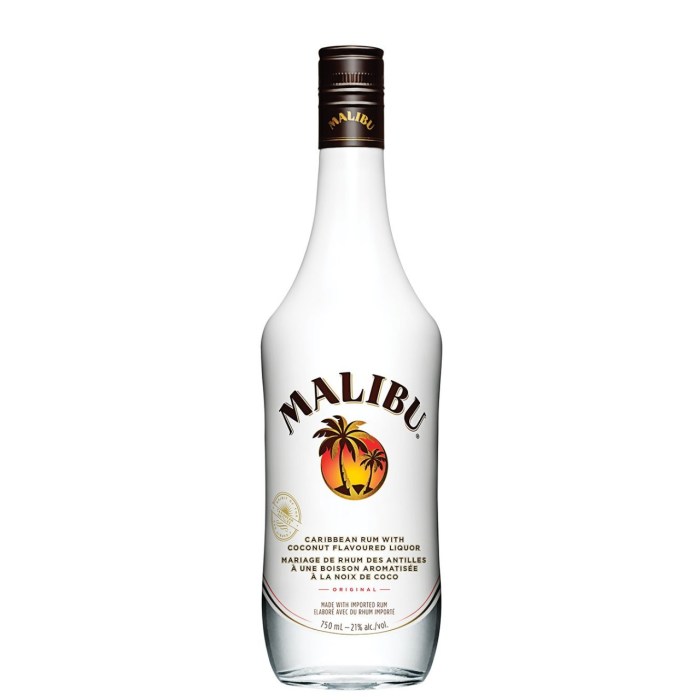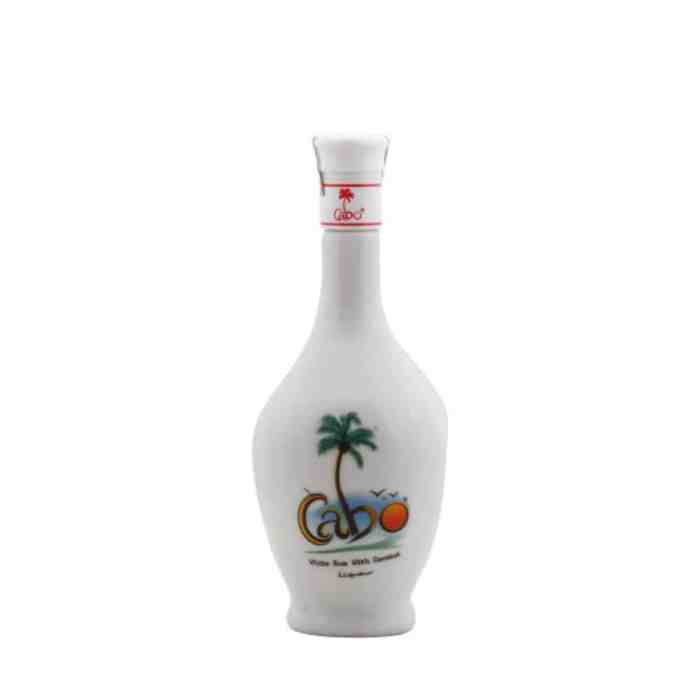Nutritional Content of Coconut Rum

Coconut rum nutrition facts – The shimmering, deceptively innocent liquid in the bottle holds more than just the promise of a tropical escape. Coconut rum, a concoction of rum and coconut flavoring, carries a nutritional profile that’s as complex as the stories whispered on a moonlit beach. Understanding its composition – the subtle sugars, the caloric content, the surprising absence of certain nutrients – is key to enjoying it responsibly.
Average Nutritional Information per Serving
The nutritional breakdown of coconut rum can vary significantly depending on the brand and specific recipe. However, a typical 1-ounce serving will generally fall within a certain range. The following table provides an approximation; always check the individual product label for the most accurate data. Remember, these figures represent the
drink* itself, not any mixers or additions.
| Nutrient | Approximate Value per 1 oz Serving |
|---|---|
| Calories | Approximately 60-80 |
| Carbohydrates | Approximately 1-2 grams |
| Fat | 0 grams |
| Protein | 0 grams |
| Alcohol Content | Approximately 20-40% (depending on the proof) |
Added Sugars and Their Impact
The sweetness of coconut rum often comes from added sugars, frequently in the form of high-fructose corn syrup or sucrose. These added sugars contribute significantly to the overall calorie count and can have various health implications if consumed excessively. High sugar intake is linked to weight gain, increased risk of type 2 diabetes, and other metabolic disorders. The seemingly innocent indulgence of a coconut rum cocktail can quickly escalate into a substantial sugar load, especially when mixed with sugary juices or sodas.
Consider the impact of a piña colada, for instance, where the inherent sugars in the rum are compounded by the pineapple juice and cream of coconut. The sweetness is alluring, but the consequences are quietly accumulating.
Variations in Nutritional Content Across Brands, Coconut rum nutrition facts
The nutritional profile of coconut rum is not a monolith. Different brands utilize varying recipes, resulting in a noticeable disparity in the levels of added sugars and consequently, calories. Some brands prioritize a more natural flavor profile, minimizing added sugars, while others lean towards a sweeter, more intensely flavored product. A careful comparison of nutrition labels across different brands is essential for the discerning consumer who wishes to make an informed choice.
One brand might boast a lower sugar content, resulting in fewer calories per serving compared to another, seemingly similar, product. This difference underscores the importance of checking individual product information rather than relying on generalized nutritional data.
Comparison to Other Alcoholic Beverages: Coconut Rum Nutrition Facts
Coconut rum, with its alluring tropical aroma and sweet taste, often occupies a unique space in the world of spirits. However, understanding its nutritional profile requires a comparative analysis with other popular alcoholic beverages. This allows for a more nuanced perspective on its potential impact on health and well-being, moving beyond the simple pleasures of taste and scent.
A direct comparison reveals both similarities and stark differences in the nutritional content of coconut rum versus vodka, whiskey, and tequila. While all these spirits provide calories primarily from alcohol, the addition of coconut cream or coconut flavoring in rum introduces variations in carbohydrate and fat content. This seemingly minor addition significantly alters the overall nutritional landscape.
Nutritional Content Comparison of Alcoholic Beverages
The following table provides a generalized comparison, as the exact nutritional values can vary depending on brand and alcohol content. It’s crucial to always refer to the specific nutritional information provided on individual product labels.
| Beverage | Calories (per serving) | Carbohydrates (per serving) | Fat (per serving) | Protein (per serving) |
|---|---|---|---|---|
| Vodka (40% ABV, 1.5 oz) | 97 | 0 | 0 | 0 |
| Whiskey (40% ABV, 1.5 oz) | 105 | 0 | 0 | 0 |
| Tequila (40% ABV, 1.5 oz) | 97 | 0 | 0 | 0 |
| Coconut Rum (40% ABV, 1.5 oz) | 120-150 (approx.) | 2-5g (approx.) | 0-2g (approx.) | 0 |
Note: Serving sizes and ABV (alcohol by volume) can significantly impact caloric and nutritional content. The values for coconut rum represent a range due to the varying amounts of coconut cream or flavoring added by different brands.
Health Implications of Consumption
The comparative analysis highlights that while vodka, whiskey, and tequila are essentially calorie sources from alcohol alone, coconut rum adds carbohydrates and potentially some fat. This increased caloric density, coupled with the often higher sugar content in flavored rums, can contribute to weight gain if consumed excessively. Furthermore, the added sugars can negatively impact blood sugar levels and potentially increase the risk of developing certain health conditions.
Excessive consumption of any alcoholic beverage, including coconut rum, can lead to liver damage, heart problems, and various other health issues. The additional sugars in coconut rum may exacerbate these risks. Responsible consumption, mindful of portion control, and awareness of individual health conditions are crucial aspects of managing potential health implications.
Potential Health Considerations

The seemingly innocuous nature of coconut rum, with its tropical allure, belies the potential for adverse health consequences associated with its regular consumption. While moderate enjoyment might seem harmless, the cumulative effects of alcohol, even in a seemingly “healthier” form like coconut rum, can significantly impact overall well-being. Understanding these potential risks is crucial for informed decision-making.The intoxicating effects of coconut rum stem primarily from its alcohol content, which interacts with various bodily systems and can exacerbate pre-existing conditions or interfere with medication efficacy.
Unraveling the nutritional secrets of coconut rum reveals a surprisingly complex profile. While the rum itself offers minimal nutritional value, the coconut cream often adds calories and fat. However, if you’re crafting a tropical cocktail, consider balancing those indulgences with a lighter mixer, perhaps inspired by the vibrant fruit flavors found in the california dreaming nutrition facts , to achieve a more well-rounded nutritional experience.
Ultimately, mindful consumption of coconut rum remains key to enjoying its tropical allure.
Furthermore, the added sugars present in many coconut rum brands contribute to a range of health issues, from weight gain to increased risk of chronic diseases. The seemingly benign nature of the drink should not overshadow its potential for harm, especially with prolonged or excessive use.
Interactions with Medications and Health Conditions
Coconut rum, like other alcoholic beverages, can interact negatively with various medications. For example, individuals taking certain antibiotics or antidepressants might experience intensified side effects or reduced medication effectiveness when consuming alcohol. Simultaneous consumption can also impair liver function, potentially hindering the metabolism and elimination of drugs from the body. Furthermore, those with pre-existing conditions like liver disease, pancreatitis, or heart problems should exercise extreme caution, as alcohol can significantly worsen these conditions.
Even seemingly mild conditions, such as gastritis, can be aggravated by the irritant effects of alcohol. Consult a physician before consuming coconut rum if you are on any medication or have a pre-existing health condition.
Long-Term Health Effects of Regular Consumption
Chronic, excessive consumption of coconut rum, like any alcoholic beverage, carries substantial long-term health risks. These risks are not merely theoretical; they are well-documented in epidemiological studies and clinical observations. The liver, in particular, bears the brunt of regular alcohol exposure, leading to conditions such as fatty liver disease, alcoholic hepatitis, and ultimately cirrhosis—a life-threatening condition characterized by irreversible scarring of the liver.
Furthermore, regular alcohol consumption increases the risk of several types of cancer, including liver, breast, and colorectal cancers. The added sugars in many coconut rum varieties contribute to weight gain, increasing the risk of type 2 diabetes, cardiovascular disease, and other metabolic disorders.
Potential Health Risks Associated with Coconut Rum Consumption
The potential health risks associated with regular coconut rum consumption are multifaceted and significant. It is important to understand these risks to make informed choices regarding alcohol consumption.
- Liver Damage: From fatty liver disease to cirrhosis, alcohol significantly stresses the liver.
- Increased Cancer Risk: Studies link heavy alcohol consumption to a heightened risk of various cancers.
- Cardiovascular Problems: Alcohol can negatively impact heart health, increasing the risk of heart disease.
- Pancreatitis: Inflammation of the pancreas, a potentially severe condition.
- Weight Gain and Metabolic Disorders: The sugar content contributes to weight gain and related problems.
- Mental Health Issues: Alcohol can worsen anxiety, depression, and other mental health conditions.
- Drug Interactions: Alcohol can interfere with the effectiveness of many medications.
- Alcohol Dependence: Regular consumption can lead to alcohol dependence and addiction.
Visual Representation of Nutritional Information
Imagine a swirling vortex of liquid, a pale amber hue tinged with the faintest suggestion of gold. Within this translucent swirl, tiny specks of color represent the nutritional components of a typical serving of coconut rum. A dominant, almost overwhelming, pale yellow expanse represents the carbohydrates, a vast sea stretching across the visual field. A small, tightly clustered island of deep red signifies the negligible amount of protein, barely a speck in the ocean of carbs.
A minuscule, almost invisible fleck of bright orange represents the fat content, so insignificant as to be nearly lost in the amber depths. The remaining space, a subtle, almost imperceptible shift in the amber’s tone, hints at the presence of trace minerals and vitamins. This visual representation, though imaginary, encapsulates the stark reality: coconut rum is predominantly carbohydrate.A pie chart would effectively illustrate this disparity.
The largest slice, a hefty portion of the circle, would be devoted to carbohydrates, its pale yellow radiating outward. The protein slice would be a thin sliver, barely visible, a stark contrast to the carbohydrate’s dominance. The fat slice, even smaller, would be a tiny wedge, almost lost in the shadow of its larger neighbors. The remaining portion, representing the trace elements, would be divided into even smaller segments, each a tiny fraction of the whole.
The overall effect would be a visual testament to the predominantly carbohydrate nature of the drink.Pie Chart Representation: A visually striking pie chart would instantly communicate the nutritional profile. The stark contrast in the size of the slices, particularly the overwhelming dominance of the carbohydrate section compared to the minute portions of protein and fat, would leave an undeniable impression on the viewer.
This clear visual hierarchy would help individuals grasp the nutritional composition far more readily than a simple list of numbers. The relative size of each segment would immediately convey the proportional contribution of each nutrient, making the information accessible and easily understood, even for those with limited nutritional knowledge. This direct visual representation bypasses the need for complex numerical analysis, offering a clear, immediate understanding of the nutritional content of coconut rum.
General Inquiries
Does coconut rum have more sugar than other rums?
Generally, yes. The added coconut flavouring often involves extra sugars. Always check the label though, as it varies between brands.
Is coconut rum gluten-free?
Most coconut rums are gluten-free, but double-check the label to be sure, just in case. Some brands might use additives that contain gluten.
Can I mix coconut rum with anything?
Mate, the possibilities are endless! It’s ace in cocktails, but also surprisingly good on its own with some ice. Experiment and find your fave combo.
What are the long-term effects of drinking too much coconut rum?
Like any alcohol, excessive consumption can lead to liver damage, weight gain, and other health problems. Drink responsibly, yeah?
